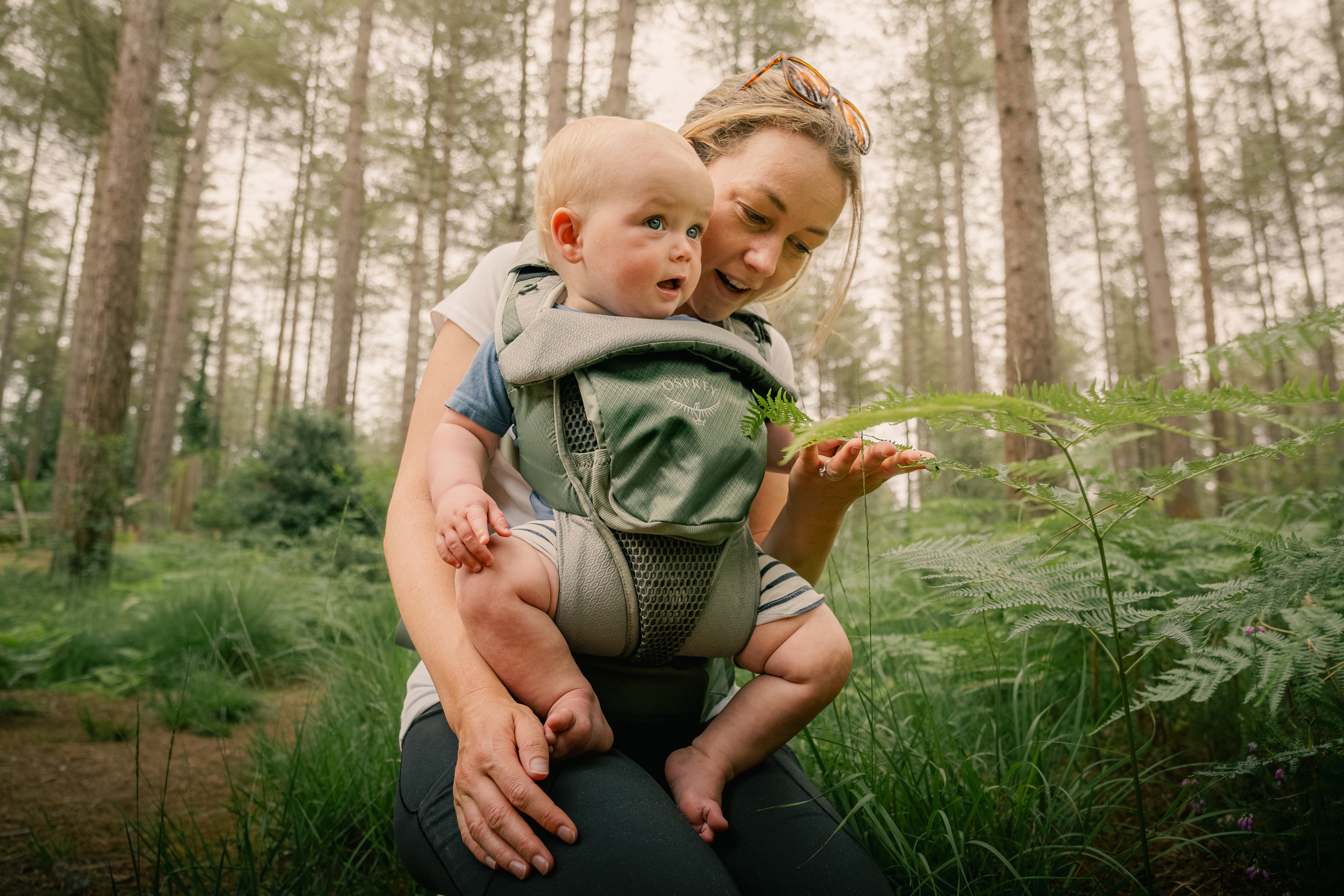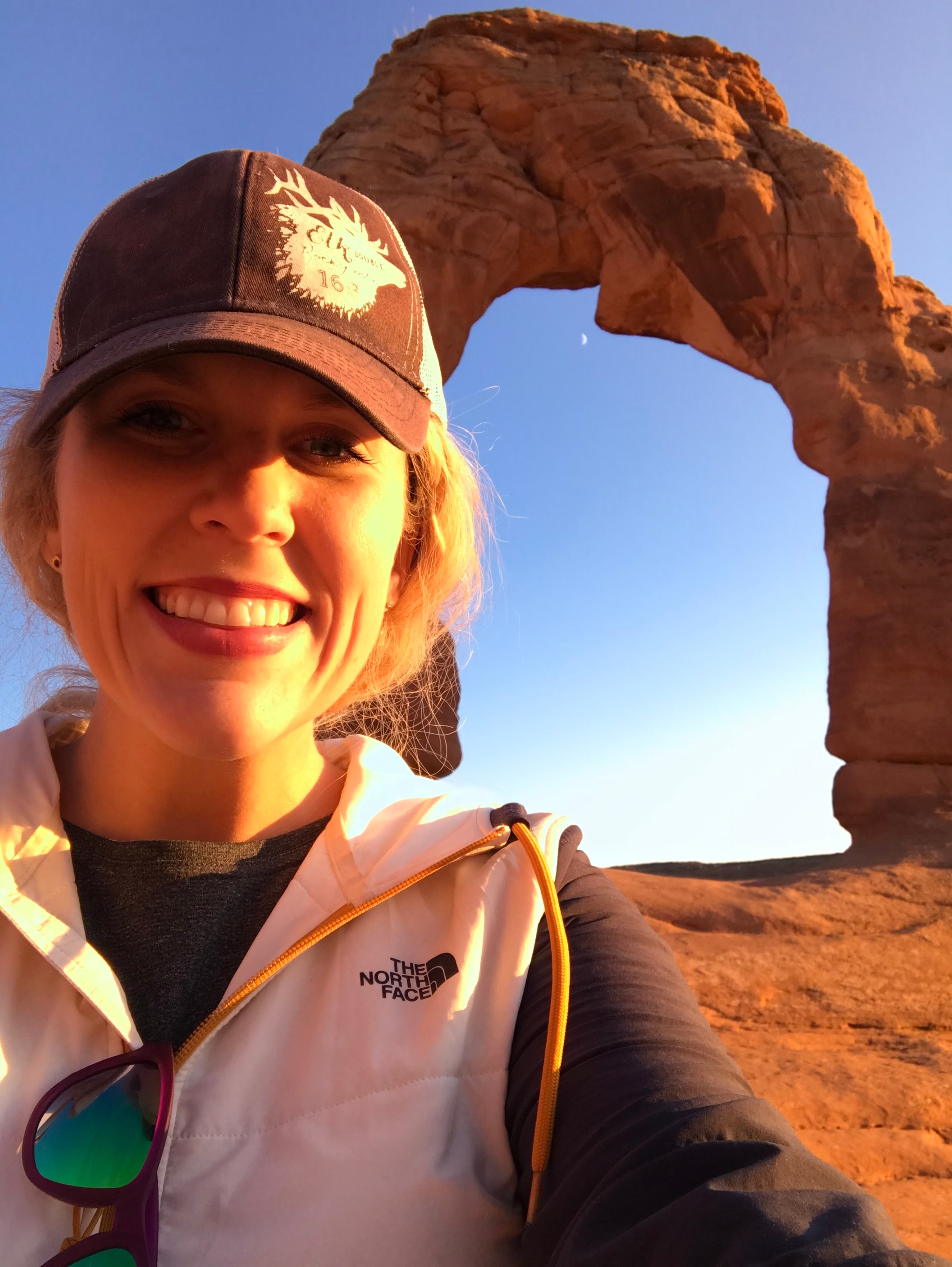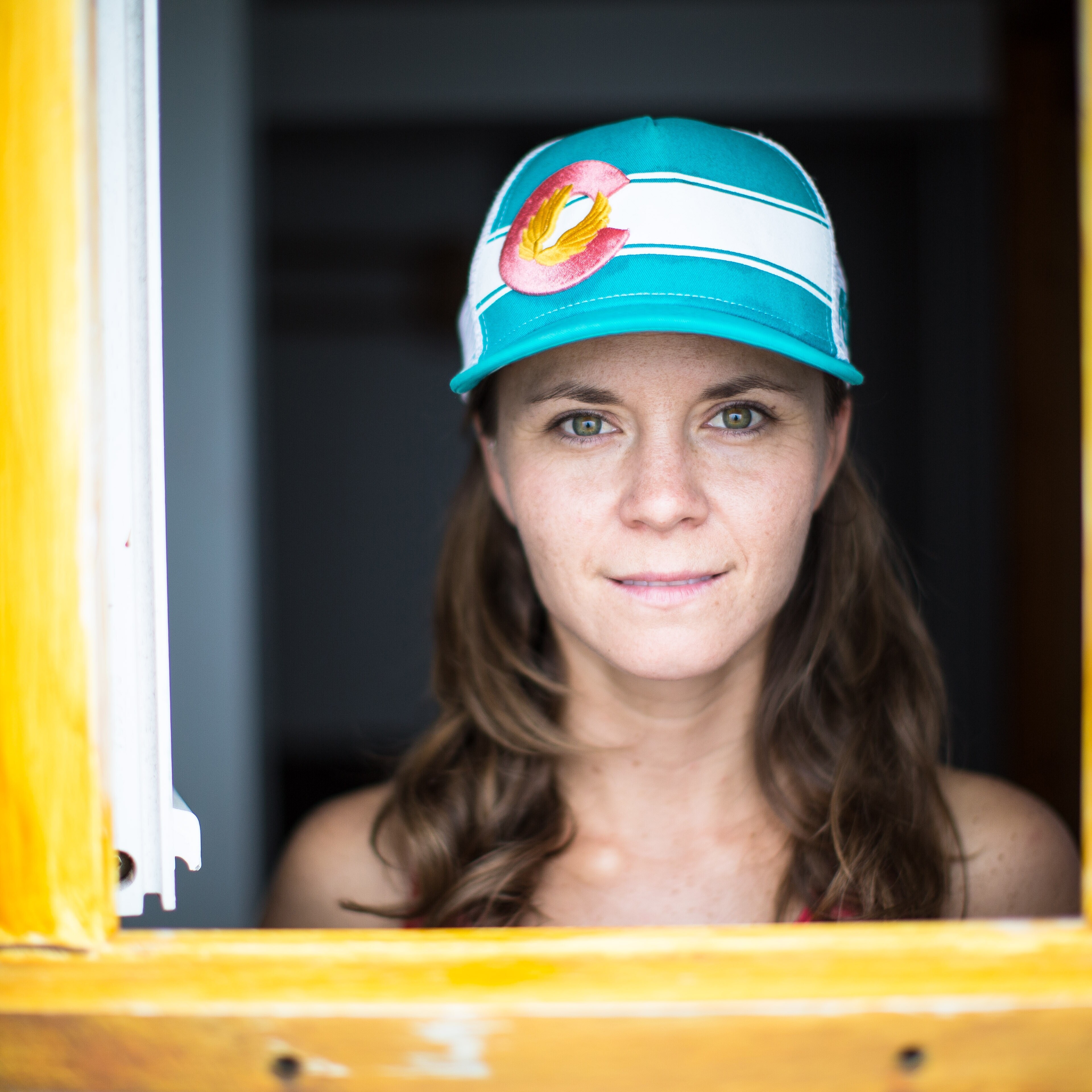Hiking with kids is tough as it is—you don't need an uncomfortable child carrier to make the experience even more difficult. Thankfully, the days of wooden boards and leather straps are in the rearview mirror as outdoor companies have come to understand that families want to spend time together in nature. With modern technologies and materials, the new generation of child carriers comes equipped with greater suspension systems, more dialed-in fits and bevies of features not previously available. But which one is the best for you?
More than 15 REI Co-op Members around the country put foot to trail—with kiddos in tow—in an effort to test the best carriers sold at REI. They hiked 14ers, slogged through rain forests, handled diaper blowouts and negotiated toddler peace treaties to bring you the five best child carrier backpacks of the year, specifically looking at suspension, comfort and storage.
The 5 Best Kid Carriers of 2025: Tested
For quick recommendations, check out the results of our round-robin here, or scroll down for in-depth reviews of our favorite kid carrier backpacks available at REI.
- Osprey Poco Premium Child Carrier
- Osprey Poco LT Child Carrier
- Osprey Poco Soft Child Carrier
- Kelty Journey PerfectFIT Elite Child Carrier
Editor's note (6/25/25): This guide has been updated with two new tested products.
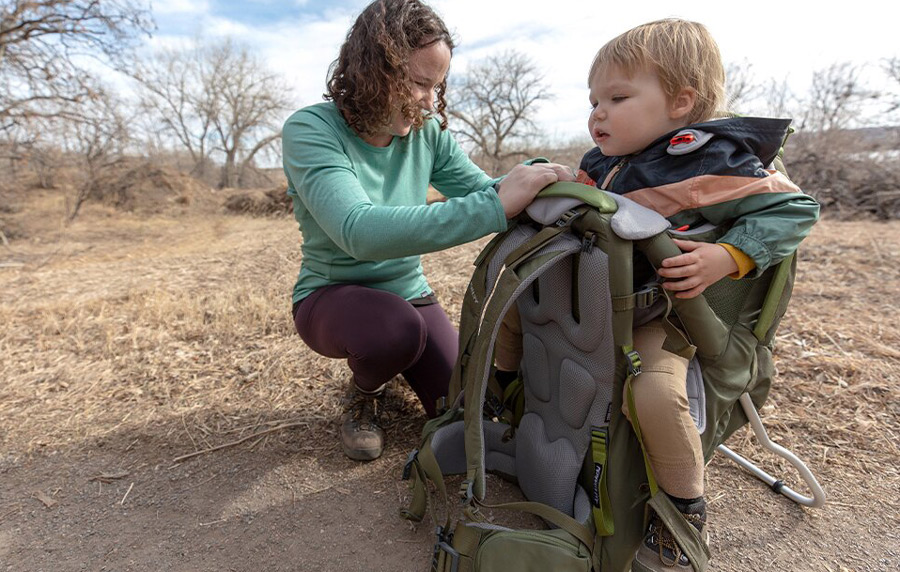
Osprey Poco Premium Child Carrier
Score 90
Weight 8 lbs. 5.4 oz.
Gear capacity 36 liters
Max weight (gear, child and pack) 48.5 lbs.
Best for Backpacking, hiking, camping
Kids and gear weigh a lot, but the Poco Premium handles the load with ease—and now it handles even more. This new design replaces and innovates on the award-winning Poco Plus from Osprey, with back-friendly continuous suspension featuring lightweight tensioned mesh extending the carrier's length, from top to lumbar. That means a pack that breathes (mercifully!) and automatically matches your body's contours for a glovelike fit that allows you to move freely. One tester who took her 18-month-old to the Utah desert reports that the ventilation kept her from getting too hot even while hiking for several miles with a sacked-out kid in tow. The adjustable torso let her easily swap with her husband on the way out from one day's 10-mile out-and-back trek.
With a whopping 36 liters of gear storage (the most on this list, by far), the Poco Premium is an obvious choice for long hauls, and the ample storage accounts for the higher price tag. No matter where you look, there are pockets: Two large zippered compartments on the back can swallow an ultralight sleeping bag, sleeping pad, trail snacks, a stuffy pal and a few extra layers, while a stretchy stash pocket wipes and a trail map. Two zippered hipbelt pockets hold a snack and compass or headlamp, but are too small for most smartphones. Stuff your water bottle into its own sling, accessible just past your right hip.
While the adult wearing the carrier appreciates the ergonomic back and plush padded shoulder pads, it's kid's comfort that's the ultimate test. Buckle your junior hiker securely into the padded cockpit using the Double Halo harness with front-facing arm loops, and let their little piggies feet rest in the adjustable stirrups. Both the harness and child seat are removable and machine washable.
Every tester in our crew praised one particular feature: the included UPF 50+ sunshade. It tucks away in a petite pocket but easily deploys with small tabs to protect your babe from sunrays or light precip. Stiff mesh paneling on its sides allows for a breeze to pass through and makes the side of the pack strong enough to prop up a snoozing baby's head. Buy here.
Bottom Line: It's not overpacking if it fits, and the Osprey Poco Premium has space for just about everything you and your little one need for the long haul.
Testing Stats:
- Total mileage: 33
- Testing states: Minnesota, Utah
Osprey Poco LT Child Carrier
Score 92
Weight 5 lbs. 9 oz.
Gear capacity 25 liters
Max weight (gear, child and pack) 48.5 lbs.
Best for Travel, day hikes, everyday use
You won't find a lighter internal-frame child carrier on this list. Osprey slashed ounces from its well-loved Poco series by using a shorter frame and less overall padding in the hipbelt. End result: A featherweight that's perfect for adventure travelers or urban families moving quickly through tight spaces (well, as fast as one can move with a child). Even though the Poco LT is shorter, the carrier still boasts 6 inches of adjustability in the torso, fitting a variety of body types. (Note: The adjustability didn't do quite as much for testers taller than 6 feet.) But the real magic is thanks to the foldable frame that allows the Poco LT to collapse flat for storage or travel. A zippered panel seals in the hipbelt and shoulder straps, yet easily stashes away in a hidden pocket when not in use.
Features are minimal on the Poco LT, but the carrier still offers two stretchy mesh pockets on the hipbelt, each large enough to store a phone or snacks. The remaining gear capacity is split between two large rear pockets: a medium-size zippered compartment on top and a larger zippered storage compartment on bottom. "I easily fit extra layers, diapers, wipes, a travel changing pad, snacks and water," reports one tester after a day trip to New York City's Central Park. The built-in sunshade easily deploys from its designated zippered compartment.
Like the Poco Plus, the Poco LT uses Osprey's new harness that clips behind your child, preventing any Houdini-esque escape moves. Thanks to the shorter frame, the child headrest is minimal (if nonexistent), but the padded face rest is plenty cushy for child snoozes on the go. Added bonus: It's one of the less expensive carriers on this list. Buy here.
Bottom Line: The ultralight Osprey Poco LT is compact enough for busy streets in urban environments yet boasts enough features and storage for a day hike on the trails.
Testing Stats:
- Total mileage: 102
- Testing states: Colorado, New York, Utah
Osprey Poco Soft Child Carrier
Score 84
Weight 1 lb. 10.9 oz.
Gear capacity None
Max weight (gear, child and pack) 33 lbs.
Best for Day hiking, urban hiking, travel, everyday
Child carriers are usually designed for one of two types of outings: around town or adventure trekking. The Poco Soft from Osprey aims to meet the two in the middle with its ultra lightweight, durable, frameless design that can handle trips to grandpa's house or the nearest state park with ease. While the Poco Soft child carrier isn’t built for backcountry camping or backpacking with kids, it is versatile for use in place of similar wearable child-carrying products on the market, such as other soft-structured front packs or wrap sling.
Your budding outdoors kid can ride in three positions to suit both preference and their growth stage: front facing in, front facing out or in and back carry for older children. (Younger children should be carried facing inward until they have more neck control; they can typically be carried in front facing outward after 4 to 6 months.) Fold away the adjustable headrest when it's no longer needed. Breathable, 3D mesh kept our Indiana tester cool even as she scrambled in sandy Indiana Dunes National Park. "The dunes are a tough climb," she says, "but the breathable mesh kept both me and kiddo sweat-free."
The Poco Soft’s extra-wide padded hipbelt fits waists up to 50 inches, and tightens easily with a hook-and-loop closure that made the clipped belts of other soft carriers seem very fiddly to one tester, while a tester in Oregon found the straps "so stiff that I found it pretty impossible to tighten enough around my hips" unless there was another adult to help.
The carrier packs down for easy storage and weighs a scant 1 pound 11 ounces—about 5 pounds less than the aluminum-framed Poco LT. Storage is minimal on the Poco Soft, but before you worry where you'll store your kid's favorite cheese crackers (an absolute necessity any time you leave home), our Indiana tester found that her standard daypack/diaper bag's straps easily layered over the Poco Soft's straps, letting her tote gear in the back while her little hiker rode in front. "Stacking hipbelts with my bigger backpacking pack was also fairly comfortable," she says.
Our testers were all impressed by this pack's durability, compared with other soft carriers on the market. "You put it on and you can immediately tell this thing is built to last," says one tester whose 18 month old never once begged, "Down! Down!" "I have high confidence this would last through multiple years and kiddos," she says. Buy here.
Bottom Line: The Osprey Poco Soft wears well for everyday errands, but features like a ventilated mesh child seat and nonfluorinated durable water repellent (DWR) treatment are especially tailored for outdoor use.
Testing Stats:
- Total mileage: 22
- Testing states: Indiana, Oregon
Kelty Journey PerfectFIT Elite Child Carrier
Score 91
Weight 7 lbs. 4 oz.
Gear capacity 26 liters
Max weight (gear, child and pack) 50 lbs.
Best for Hiking
If we were in the business of reviewing testers instead of the gear they test, we would most certainly give this one high marks: Our 5-foot-2-inch mama loaded the Elite up to its 50-pound capacity with overnight gear and her 3-year-old, then strapped her infant to her front for good measure. The trio trekked nearly 8 miles on the Pennsylvania Gulch Trail in the Rockies with nary a sprained ankle. We're not surprised since the PerfectFIT Elite easily pulls double duty. The child carrier has just as much gear storage as the Kelty PerfectFIT Signature for overnight trips, but it weighs just over 7 pounds, making it a top choice for day hikes too.
Our tester was able to fit a rain jacket, a puffy, diapers, wipes, sunscreen, a medical kit and a dozen snacks in two of the Elite's large back compartments. (Her partner carried the rest of their gear in a regular overnight pack.) As anyone who's tried knows: Backpacking with toddlers can be foul. Thankfully, Kelty took that into account and created the only pack in our test with a zippered "dirty" compartment that seals away stench and mess. Our testers used it like a hamper for soiled clothes or simply to partition dirty diapers away from everything else. The pack has two additional zippered hipbelt pockets, two side mesh pockets and one zippered organizer pocket to hold small items like car keys and lip balm.
The Elite's adjustable back frame fit our 5-foot-2-inch mom fine, as well as her 6-foot husband. "I could even cinch it tightly around my hips, and that never happens," she raved after the family's trip to Colorado's Silver Dollar Lake. Caveat: The pack's center of gravity was a bit high, which was especially noticeable when the toddler zoomies took effect. Other features include a hydration sleeve (but it only fits a bladder horizontally, which posed a problem for testers with vertical reservoirs) and a sunshade. Bummer: The kid harness doesn't allow for side access, causing exhausted parents everywhere problems with coaxing fussy toddlers in. Buy here.
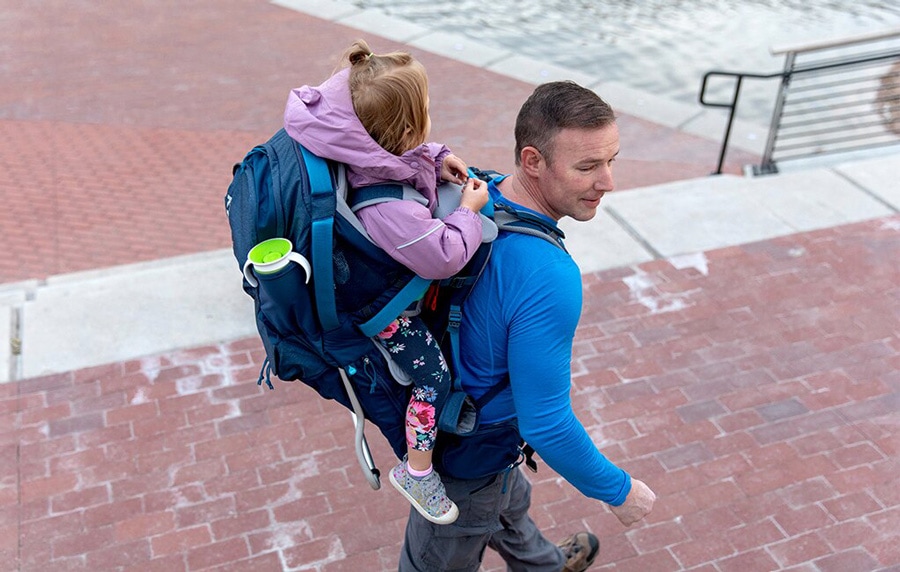
Bottom Line: The feature-rich Kelty Journey PerfectFIT Elite has all sorts of pockets, including one specifically for dirty gear, making it a versatile option for type-A packers.
Testing Stats:
- Total mileage: 45
- Testing states: Colorado, Utah
Kelty Journey PerfectFIT Signature Child Carrier
Score 87
Weight 6 lbs. 6 oz.
Gear capacity 26 liters
Max weight (gear, child and pack) 48.5 lbs.
Best for Hiking
There's no junk in this sleek and minimal child carrier from Kelty, giving it perhaps the best bang for your buck in our test. Well under 7 pounds, the Signature was the second-lightest framed pack (after the Osprey Poco LT), but it includes a handful of storage pockets for parents hauling more gear. A large zippered pocket on top and a zippered compartment on the bottom easily swallowed extra layers, water and food, and the hipbelt pockets stashed lip balm, keys and a few gels. The included sunshade neatly stows away inside its own pocket. Trade-off: The center of gravity sits higher in the Signature, so smaller testers with heavier children struggled with upper-back discomfort on trail. Buy here.
Bottom Line: The affordable, lightweight Kelty Journey PerfectFIT Signature might be no-frills, but that just leaves all the excitement to the scenery.
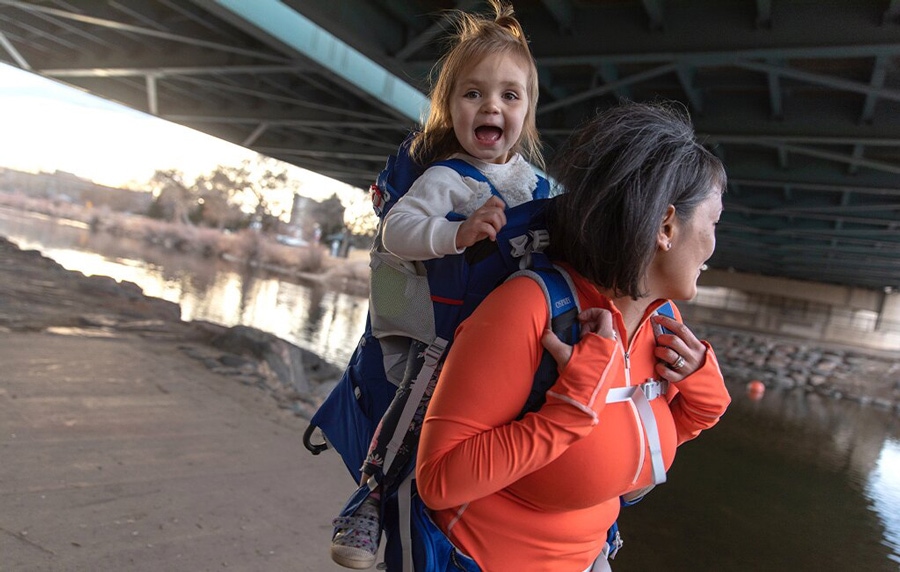
Buying Advice
Before taking a look at a kid carrier, take a look at your kid. If your babe is still an infant without any neck strength, your family is not yet ready for a backpack-style child carrier. Instead, opt for a soft front carrier like the Osprey Poco Soft until junior can sit upright on her own (and weighs more than 16 pounds). Once your family is ready, there are a few components to consider.
Suspension
Parental comfort on the trail is arguably more important than kid comfort (although a fussy toddler may beg to differ). If you know you will be sharing the carrier with a partner or spouse, consider a pack with an adjustable suspension like any in this roster. You want the hipbelt and straps to fit each carrier, of course, but being able to correctly size the back panel to each wearer's torso length will help transfer the load to the hips, no matter whose hips those are.
Storage
While it sounds great to have copious amounts of storage, not every family needs six different pockets. After all, more features mean more weight, so why carry extra ounces if you don't need to? Evaluate how you and your family will use the child carrier. If you know you'll only be out on mellow day hikes, opt for a slim-and-trim design that cuts pounds like the Osprey Poco LT or Osprey Poco Soft.
If your family loves multiday journeys, snag a carrier that weighs more but comes with surplus storage like the Kelty Journey PerfectFIT Elite or the Osprey Poco Premium. Your needs are personal to your family, so strongly consider those before stepping foot into a store.
Try It On
Backpacks are like strong opinions: They look a bit different on everyone. When possible, try the kid carriers on. Not only can one pack fit two adults quite differently, but kids have strong feelings about the cockpit, too. Avoid any trail time surprises by outfitting yourself in the store so you can ensure everyone is happy with your family's investment.
Methodology
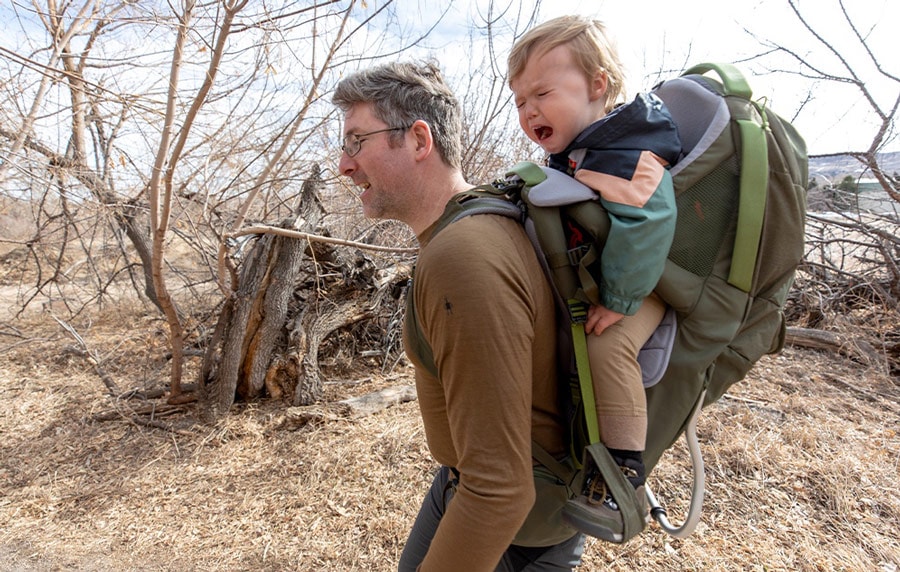
Our 18 testers tallied more than 700 miles while putting 14 child carriers through their paces. Our duos summited peaks and slogged through rivers, scaling more than 100,000 vertical feet combined across nine testing states. This, all while handling 22 backcountry blowouts, which our co-op members deftly handled with grace, humility and just a bit of parental chagrin.
At the close of the testing cycle, our testers collected their stories and rated each kid carrier on its parental comfort, child comfort, suspension, storage, durability and features. We tallied up the scores, found the averages and included the best of the best in this guide.
